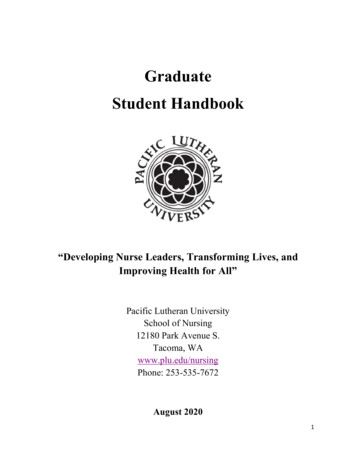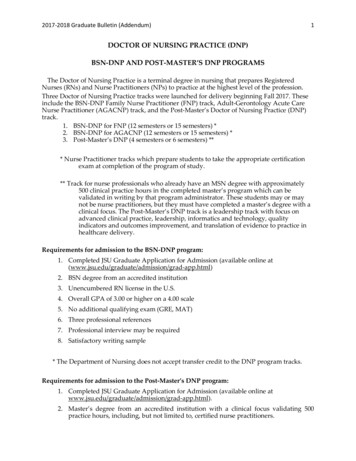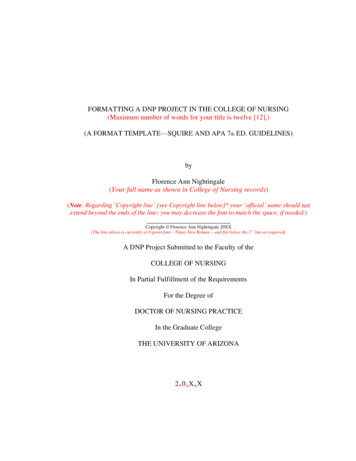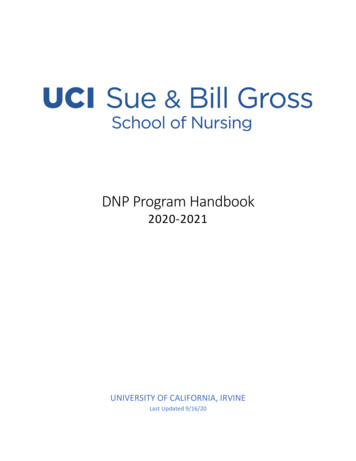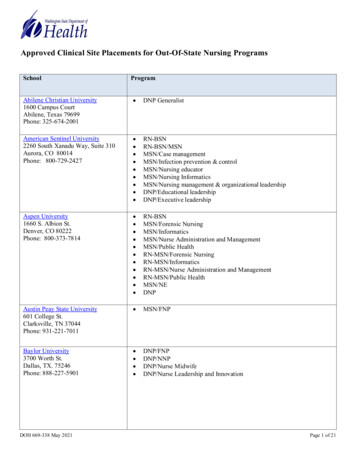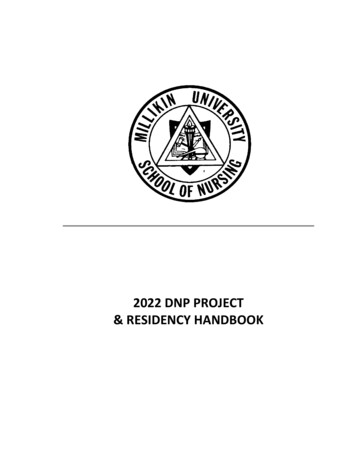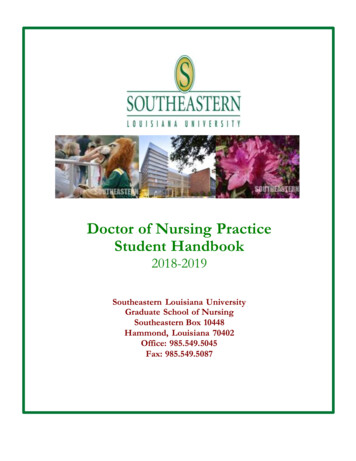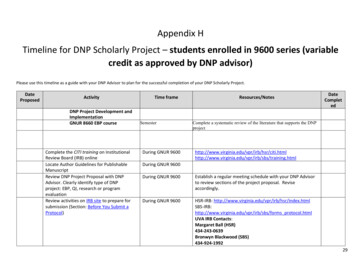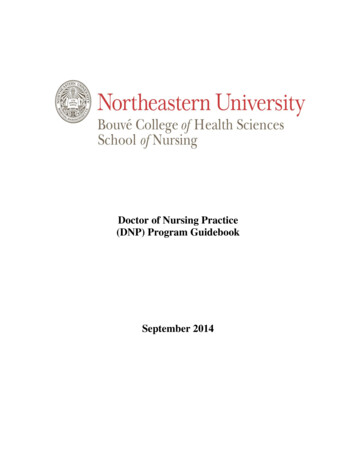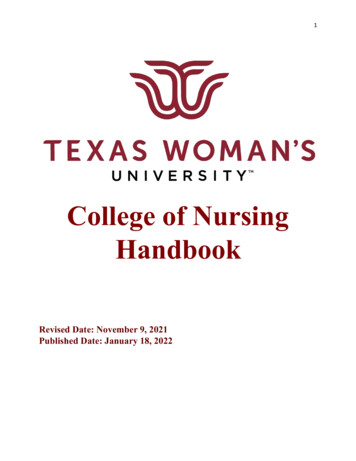
Transcription
1College of NursingHandbookRevised Date: November 9, 2021Published Date: January 18, 2022
2DisclaimerThis Handbook is neither a contract nor an offer to make a contract. While every effort has beenmade to ensure the accuracy of the information enclosed, the Handbook is updated during theSpring Semester of each year. Texas Woman’s University College of Nursing reserves the right tomake changes at any time with respect to course offerings, degree requirements, services,policies, or any other subject addressed in this document. The information enclosed is providedsolely for the convenience of the students and other readers.This Handbook supersedes all previous versions of the Handbook. Students are accountable forfamiliarizing themselves with its contents and for compliance with the policies and procedurescontained within. The information provided in this handbook is to assist students in (1) academicprogram planning and (2) meeting the requirements of the College of Nursing and the GraduateSchool for completing the Doctor of Nursing Practice (DNP) degree. This information is intendedto clarify and to supplement - not to replace, the information in the Graduate Catalog. Eachstudent should read thoroughly and comply fully with all requirements of the College of Nursingand the Graduate School.HOW TO USE THIS BOOK:This book contains information for the DNP program. All blue underlined text contains ahyperlink to other resources on both TWU websites and public websites. Place your mouse overthe text, hold the CTRL button and left click the mouse to navigate to the website. At the time ofpublication, all hyperlinks work properly.College of Nursing Student Handbook VerificationPlease note: Students are required to complete the handbook acknowledgement form and submitto the DNP Program Director within a month of starting the program. Acknowledgement form canbe found on the TWU DNP Program collaborative space (under resources).Table of ContentsLetter from the Dean4Mission and Vision5A. University5B.College of Nursing5C.Foundational Documents7Student Services and Resources8A. Division of Student Life8B.8Communication
3C.1)Pioneer Alert82)Email9Campus Closing – Severe Weather9D. Nursing Student Organizations10E.University-wide Student Organizations10F.Online Courses11Policies and Procedures12A. Registration12B.Academic Advisors12C.Academic Conduct and Professional Integrity12D. Attendance13E.Disability Support Services14F.Academic Appeal14G. Citation Style17H. Social Media17V.Doctor of Nursing Practice (DNP) Program17A. Overview17B.Program Purpose17C.Program Objectives/Competencies18D. General Requirements19E.Advisement19F.Course Work and Transfer of Credits20G. The DNP Degree Plan20H. Financial Assistance: Full and Part-time Students20I.Course Work21J.DNP Project Courses23K.Additional Information25Appendix A. DNP Crosswalk Table26Appendix B. History of the College of Nursing28Appendix C. The DNP Project Guideline Document (link)32
4Texas Woman’s University College of NursingLetter from the DeanWelcome to TWU! I wanted to personally let you know that we are glad you are here.Welcome to the DNP program at Texas Woman’s University, our practice doctorate, is infusedwith elements of forward-thinking, based on the latest evidence, and is reflective of an ongoingnational dialogue on the essential criterions for DNP practice. We are continuously revising andupdating to maintain currency, relevancy, and to incorporate the ever-changing health caresystem.By Fall 2021, we expect to markedly expand our offerings and create more opportunities forstudy in different ways: more online DNP program options, more choice. We have decreased thenumber of credit hours needed to achieve the degree, while at the same time, expanding thenumber of faculty with diverse backgrounds available to lead doctoral projects.Our DNP Faculty continues to bring a diversity of thought to our program. You can be confidentin the knowledge that experienced clinicians, scholars and teachers who are fully versed in theDNP paradigm, are leading and teaching in the program. We have a depth of experience withsupporting doctoral students who are developing their questions, fleshing out their proposals,and carrying out their DNP projects. In a collaboration between the PhD and the DNP programs,several courses are taught in both programs providing shared faculty, which is a unique strength.Finally, we have many opportunities available to our DNP students to broaden their educationalexperience such as Study Abroad, various electives, and over 900 clinical agencies across thestate of Texas for practice projects, some of which have international reputations.Best of luck to you while on this journey.Rosalie Mainous, PhD, APRN, FAANP, FAANDean and ProfessorCollege of NursingDenton, Dallas and HoustonTexas Woman’s UniversityLink to TWU CON Faculty Profiles: https://twu.edu/faculty-profiles/
5Mission and VisionA. University1. MissionTexas Woman’s University cultivates engaged leaders and global citizens byleveraging its historical strengths in health, liberal arts, and education and itsstanding as the nation’s largest public university primarily for women.Committed to transformational learning, discovery, and service in an inclusiveenvironment that embraces diversity, Texas Woman’s inspires excellence and apioneering spirit.B. College of Nursing1. MissionThe College of Nursing seeks to support and empower students of all ages andethnic groups to address the health care needs and issues of the people inTexas, the nation and the world through acquiring nursing knowledge andleadership skills for entry level, advance practice and scientific roles byintegrating health promotion and disease prevention within diverse groups ina time of rapid technological and societal change.Mission – DNP ProgramTWU DNP graduates of all ages and ethnic groups will gain the knowledge,skills, and competencies to develop and lead innovative quality improvementinitiatives that transform healthcare to meet the needs of diverse patientpopulations.2. VisionPioneering Nursing’s Future: An Adventure in ExcellenceVision – DNP ProgramTWU DNP graduates will lead and transform healthcare as implementationscholars.3. PhilosophyThe College of Nursing at Texas Woman's University offers a diversemulti-campus setting and awards degrees at the Baccalaureate, Master's andDoctoral levels. This philosophy is congruent with the mission of the universityand its commitment to prepare students for leadership and service built on asolid liberal education base and quality professional programs. It is consistentwith the fundamental beliefs about nursing and nursing’s contract with societyas described by the American Nurses Association in Nursing's Social PolicyStatement (2010). The preparation of nurses for service and leadership is guidedby the current AACN Essentials of Nursing (2006, 2021) and the Texas Board ofNursing Differentiated Essential Competencies for the Baccalaureate degree.
6The faculty of the college of nursing builds this philosophy on our beliefs aboutthe key concepts included in nursing’s predominant theoretical metaparadigmand on our beliefs about education and learning. Individuals are holistic humanbeings in constant interaction with their environment; each has inherent worthand dignity and is unique in capabilities, beliefs, and interests. Individuals are anintegral part of culturally diverse families, groups, communities, andpopulations. Society influences an individual’s perception of health care needsand is charged with the responsibility for aiding the individual, particularly thosein vulnerable populations, in the fulfillment of these needs. Society entrustsnurses as competent providers of optimal health care and education. Health is astate of physiological, psychological, socio-cultural, developmental, and spiritualfunctioning that allows individual members to achieve maximum potential. Thehealth of an individual has a direct effect upon the family, group, community,and population. Health promotion and disease prevention are employed at allsocietal levels to improve population health.Nursing is a synthesis of art and science. Practitioners of nursing balancethe use of science and technology with the art of caring to achieve optimaloutcomes. The science of nursing is based on nursing theories, natural andbehavioral sciences, and patient care technologies. This knowledge, togetherwith current evidence, clinical/critical reasoning, and multiple ways of knowing,is used to develop, evaluate, and achieve safe patient care and optimum healthoutcomes across all environments. The art of nursing, grounded in the humansciences, is exemplified by characteristics of caring such as presence,authenticity, advocacy, empowerment, and connections with people across allcultures in their experiences of health. Nurses interact with individuals, families,groups, communities and populations in collaboration with other healthcareprofessionals for the purposes of promoting, maintaining, protecting, andrestoring health in all stages of the life cycle or supporting a peaceful death.Nurses guide, mentor, support, and lead other nurses to achieve excellence innursing practice. Nurses are prepared to function in leadership roles and toaddress the political, social, ethical, economic, and policy issues that affecthealth care at local, state, national, and international levels. Fundamental tonursing are the values of altruism, autonomy, human dignity, integrity, and socialjustice.We, as a community of nurse educators, believe that education, research,and service are the foundation for the practice of professional nursing. Facultyis responsible for contributing to the vitality of the college and the universitycommunity and for developing, maintaining, and evaluating educationalprograms. Faculty is responsible for and committed to providing learningexperiences that enable students to cultivate critical thinking, clinical judgment,leadership skills, and the professional nursing values needed to functioncompetently and to cultivate caring practices in an increasingly complex healthcare system. Faculty is committed to developing supportive learningenvironments that encourage students to successfully achieve the objectives ofthe offered program. Faculty is responsible for contributing to an environment
7conducive to academic freedom, service, and scholarship. Students, as adultlearners with multiple roles, are responsible for contributing to the learningenvironment by being actively involved in the learning process; to seek, toquestion, and to propose and implement new ideas using peer, faculty, anduniversity resources to further their own learning and to serve the greatercommunity.C. Selected Documents and Resources for Doctoral EducationThe following are foundational documents for doctoral education in nursing. The studentis responsible for reading, understanding, and acting in accordance with the principlesoutlined in these documents. The web links are provided for each of the documents.Vital resources:AACN DNP tion-Programs/DNP-EducationAACN 2021 cademicNursing/pdf/Essentials-2021.pdfANA Standards for Clinical cy/scope-of-practice/Other resources:National Organization of Nurse Practitioner Faculties (NONPF) m/resource/resmgr/competencies/20170516 NPCoreCompsContentF.pdfAmerican Organization of Nursing Leadership (AONL) eader-competenciesAACN Nursing Research Position rchANA Code of /nursing-excellence/ethics/Texas Board of Nursinghttp://www.bon.texas.gov/laws and rules rules and regulations.asp#D. Research ToolsDNP Library Guidehttps://libguides.twu.edu/c.php?g 270149&p 8087177
8Center for Research Design & Analysis nd-analysis-crda/Student Services and ResourcesA. Division of Student Lifehttps://twu.edu/student-life/MissionThe Division of Student Life actively supports the mission of Texas Woman's University andits learning environment. It is the mission of the Division of Student Life at Texas Woman’sUniversity to support and enhance the student’s academic experience by providingservices and programs that holistically develop the student. These programs and servicesare provided on all campuses and at a distance via a variety of media. The Division ofStudent Life seeks to provide the environment and support to assist TWU’s students toreach their potential in leadership and community service. Under this division, you willalso find multiple resources in the TWU Student Handbook located al/KB/?CategoryID 4491Office LocationsDenton CampusBrackenridge Hall; Room 206Phone: 940-898-3615Fax: 940-898-3629T. Boone Pickens Institute of Health Science, Dallas Campus5500 Southwestern Medical BlvdSuite 3600Phone: 214-689-6697Fax: 214-689-6688Institute of Health Sciences - Houston Campus6700 Fannin St.Suite 2300Phone: 713-794-2157Fax: 713-794-2169B. Communication:1) Pioneer AlertTexas Woman's University Department of Public Safety uses a variety ofmethods to alert students, faculty, and staff in case of an emergency oncampus. In case of an emergency the Pioneer Alert system can deliver
9emergency messages from the police to an affected campus by the followingmethods:a. Campus computerb. Text messagec. Personal emaild. Personal telephoneTo receive notification by text message, personal telephone, or personal emailyou must register your information into a secure database by going here. Theinformation entered is secure and will never be used for any reason otherthan emergency alert notification.2) EmailYour email account is created automatically when you create yourPioneer Portal account. Email is available on and off campus via yourPioneer Portal account.All TWU communication is sent through your Portal email. If you do notcheck your Portal email, you MUST forward it to another account. You maydo so by logging into Pioneer Portal, clicking "My Settings," then"Forward/Unforward” my email.To access your email from the web (on and off campus): Log in to Pioneer Portal, then click on My Email. You may also clickon Google Mail from the TWU Internet Home Page (bottom left) A new page will load.In the "username@twu.edu" box, type in your usernamefollowed by "@twu.edu". An example of the username is:jpioneer@twu.edu .In the "Password:" box, type in your TWU Portal password. Click “Sign In.”The expectations are that students can be contacted through TWU email orthe phone number on file in the College of Nursing and that they will respondto email or a phone call within a 24-hour time period, excluding weekendsand holidays. It is imperative that students keep their information current,particularly their phone numbers.C. Campus Closing – Severe WeatherA severe weather watch is defined as an atmospheric condition that is likely to producesevere weather. A severe weather warning is defined as severe weather occurring in thearea that necessitates precautions being taken. Examples of severe weather includetornadoes, cyclones, and high winds.
10For information on bad weather closings at TWU, please call the appropriate informationnumber n.713-794-2310You may also find information about severe weather on your local radio and TV stations.You will also be notified by a Pioneer Alert message.Radio StationsDallas:TelevisionKRLD 1080 AMDallas:KLIF 1190 AMDenton: Cable: Channel 25Houston: KPRC 950 AMKTRH 740 AMChannels 4, 5, 8, & 11Houston: KPRC TV - Channel 2KTRK TV - Channel 13KIKK 96 FMKODA 99.1 FMPlease note: IF THE CAMPUS IS CLOSED, YOU CANNOT PARTICIPATE IN THECLINICAL SETTING. If you are in a clinical setting when the Campus closes, you willbe required to leave the site immediately or when it is safe to do so.D. TWU COVID-19 Pandemic Resourceshttps://twu.edu/coronavirus/E. Nursing Student Organizationsa. Texas Student Nurses AssociationTexas Nursing Students' Association, Inc. (TNSA) is a student nursingassociation dedicated to promoting professionalism and leadershipfor today's studentsb. National Student Nurses AssociationThe National Student Nurses' Association mentors the professionaldevelopment of future registered nurses and facilitates their entrance intothe profession by providing educational resources, leadership opportunities,and career guidance.
11c. Sigma International Honor Society of NursingSigma Theta Tau is the international honor society for nursing. Membership is byinvitation only either as a nursing student who demonstrates excellence inscholarship or as a community leader.MissionThe mission of the Honor Society of Nursing, Sigma Theta Tau International, isto support the learning, knowledge, and professional development of nursescommitted to making a difference in health worldwide.VisionThe vision of the Honor Society of Nursing, Sigma International, is to create aglobal community of nurses who lead in using knowledge, scholarship, serviceand learning to improve the health of the world’s people.MembershipMembership is by invitation to baccalaureate and graduate nursing studentswho demonstrate excellence in scholarship, and to nurses who exhibitexceptional achievements in nursing.TWU Beta Beta ChaptersDallas Campus: on omeF. University-wide Student Organizations1) A full list of all student organizations and contact informationis located at Diversity, Inclusion and Outreach - TexasWoman's University2) Student Governmenta. Dentonb. Dallasc. HoustonG. Online CoursesBy state definition and by TWU’s definition, online courses have 51%-100% oftheir content delivered online. All TWU online courses utilize the Canvas LearningPlatform. You must establish a TWU Pioneer Portal account to take a course onCanvas. To learn about Canvas, read the following online pages:Pioneer Portal: https://portal.twu.edu/Canvas Student Guide: https://guides.instructure.com/m/4212Teaching and Learning with Technology: https://twu.edu/tlt
12Policies and ProceduresA. Registration1) You will register for your classes through the Pioneer Portal. You maydownload the instructions athttps://twu.edu/registrar/registration/2) Special Instructions for courses with restricted entryIf a course is restricted, only the department may provide the 5-digit course code for astudent to be able to register. In this case, the student must use "ExpressRegistration" to complete registration for this course. You will get the course codefrom your academic advisor.B. Academic Advisors1) Each student will be assigned a faculty academic advisor. Academic advisementsessions are primarily provided during individual appointments at the DentonCampus, Houston, and Dallas Centers. The Program Director is available tostudents who encounter problems or need further assistance.C. Academic Conduct and Professional Integrity1) Academic IntegrityAcademic integrity is the foundation of the academic community. Because eachstudent has the primary responsibility for being academically honest, students areresponsible for reading and understanding all sections in the University StudentHandbook that relate to standards of conduct and academic life. Students whoviolate University or College of Nursing rules on academic dishonesty are subjectto disciplinary penalties, including the possibility of failure or removal from acourse, disciplinary probation, and/or dismissal from the College of Nursing andthe University.2) Definitions:Academic dishonesty includes, but is not limited to, cheating, plagiarism, collusion,fabrication, falsification, falsifying academic records, or other acts intentionallydesigned to provide an unfair advantage to the student and/or the attempt tocommit such acts.i. Cheating includes, but is not limited to, intentionally giving, or receivingunauthorized aid or notes on examinations, papers, or class assignmentsintended to be individually completed. Cheating also includes theunauthorized copying of tests or any other deceit or fraud related to thestudent’s academic conduct or violating the guidelines set out by a facultymember for assignments and/or exams.ii. Collusion occurs when a student collaborates with anotherperson without authorization when preparing an assignment.iii. Fabrication occurs when a student makes up data or resultsand records or reports them.
13iv. Falsification occurs when a student manipulates research materials,equipment, or processes or changes or omits results such that theclinical experience or research is not accurately reflected in therecords.3) Plagiarism occurs when a student obtains portions or elements of someone else’swork, including materials prepared by another person or agency, and presents thoseideas or words as her or his own academic work. The intentional or unintentional useby paraphrase or direct quotation of the published work of another person without fulland clear acknowledgment shall constitute plagiarism. Another form of plagiarism iscalled self-plagiarism and occurs when you reuse your own work such as from a priorclass or assignment without giving credit to that prior work. This is still considered aform of academic dishonesty and is considered a serious offense.D. Attendance1) The University expects students to attend all classes regularly and punctually. Itis a policy of the University not to allow a fixed number of "cuts" in any class.The only excused absences are for:a. Illness certified by a licensed health care providerb. Serious illness or death in student's immediate familyc. Being away from the campus with the sanction of the University or fora religious holiday.Consistent class attendance is vital to academic success and is expected of allstudents. Grades are determined by academic performance, and instructorsmay give students written notice that attendance related to specific classroomactivities is required.Absences do not exempt you from academic requirements. Excessive absences,even if documented, may result in your failing the course. An “Incomplete” maybe granted if you have a passing grade, but only if you meet the criteria for an“Incomplete,” and the instructor determines it is feasible for you to successfullycomplete remaining assignments after the semester. Such determinations arewithin the discretion of the instructor.Instructors may keep a record of class attendance and include it in thesemester report to the Registrar. The total number of absences is to be enteredon the grade report at the end of the semester.Please review the leave of CON Leave of Absence -CON-Student-Leave-of-Absence-Request-Policy.pdf2) Religious HolidaysThe state law allows students in Texas Colleges and Universities to make up missedwork if they are absent because of a religious holy day. The law requires aninstitution of higher education to allow a student who is absent from classes forthe observance of a religious holy day to take an examination or complete an
14assignment scheduled for that day at another time. The student must notify theinstructor prior to the day of the planned absence. The law defines a "religiousholy day" as a day observed by a religion whose place of worship is exempt fromproperty taxation under state law. If a student plans to be absent for anobservance, written notice must be given to each instructor by the 15th day of thesemester.The law, which became effective August 1985, further states that a student whois excused under these conditions, may not be penalized for the absence; but theinstructor may appropriately respond if the student fails to satisfactorilycomplete the assignment or examination.E. Disability Support ServicesIt is the policy of Texas Woman's University to provide reasonable accommodationsfor qualified individuals with disabilities. This college will adhere to all applicablefederal, state, and local law, regulations, and guidelines with respect to providingreasonable accommodations as required to afford equal educational opportunity. It isthe student's responsibility to contact Disability Support Services and the facultymember in a timely manner to arrange for appropriate accommodations.The Disability Support Services Office is designated to respond to the special needs ofstudents with disabilities. The professional staff in this office acts as the centralizedclearing house for provision of those accommodations/services that will mostappropriately meet each student's needs. The office provides or locates appropriateservices that allow students to have equal access to academic programs and services.Disability Support Services endeavors to provide the assistance and encouragementthat the student needs in meeting the challenges of university life.To obtain services a student must meet the following criteria:1. Receive notice of acceptance to TWU.2. Complete an application form available through the Disability Support ServicesOffice.3. Provide documentation indicating the presence of a disability thatsubstantially limits one or more major life activities.4. Apply well in advance of the semester for which assistance is needed toobtain services in a timely manner.Additional information, including a Campus Access Guide, may be obtained by contactingDisability Support Services, CFO 106, P. O. Box 425966, Denton, TX 76204-5379, 940/8983835, (Voice) or TDD access at 940/898-3830. dss@twu.eduF. Academic AppealTexas Woman’s University is committed to the fair treatment of all students who havecomplaints and appeals. The university has traditionally guaranteed students every
15opportunity for a fair, prompt, and thorough review of complaints and appeals. Studentsare encouraged to begin resolving a complaint or appeal at the level at which thecomplaint or appeal originated. Students should follow university procedures anddeadlines to advance a complaint or appeal. TWU’s Academic/Administrative Complaintsand Appeals policy guides students in the complaint and appeal process.Complaints or appeals at each level must be made in writing no later than 10 class daysafter the date of the decision at the previous level unless otherwise stipulated in state orfederal law. The 10 days for appeal at each level do not include weekends, holidays, ordays between academic sessions. The faculty member or administrator receiving thecomplaint or appeal will respond within 10 class days, not including weekends, holidays, ordays between academic sessions. Review and decision may require a longer period oftime.The TWU Academic/Administrative Complaint and Appeal Form [Word]is to be used forcomplaints and appeals. To select the appropriate office to begin the process, consultProcedures for Academic/Administrative Complaints and Appeals of TWU Decisionsdocument. The procedures provide directions for the sequence of offices each type ofcomplaint or appeal should follow to a final decision. The form may be completedelectronically and submitted by email to the appropriate office within 10 days of theoccurrence of the complaint. Addendums are permissible to concisely document thecomplaint and may be attached to the email or delivered to the corresponding office.Please print a copy of the completed document at each level for your records.See Academic/Administrative Complaint and Appeals Process on the next Page.
16Graduate Grade Appeals, Advising Issues, & Other Academic Program Issues
17G. Citation StyleThe Publication Manual of the American Psychological Association (APA), current 7thedition, is used by the CON for citations, references, and papers. Students are expectedto comply with this formatting style.H. Social MediaSocial network sites such as Facebook, SnapChat, LinkedIn, Twitter, are digital platformsand distribution mechanisms that facilitate student communication with other students.Participation in such platforms may have both positive and negative consequences.Students are not restricted from using such platforms, but it is expected that you willfollow acceptable social and professional behaviors and comply with all federalgovernment regulations including, but not limited to Health Insurance Portability andAccountability Act (HIPAA) guidelines. The following are examples of materials absolutely prohibited to post online (e.g.,pictures of patients, patient identifiers, suggestive pictures/content).If you identify yourself as a TWU CON Student, everything you post reflectson you and the University. Post wisely. You may create a private class page/site, but you may not create a publicTWU CON page. Do not share information about tests, clinical sites, patients, or facultyonline.Remember, your future employer will search your Social Media Pages prior toemployment. Only post things that can pass the “Front Page of the NewspaperTest” (Would you be comfortable if your material were on the front page of thenewspaper?)Texas Board of Nursing position statement on Social MediaANA on Social MediaTWU Social Media Policy V. Doctor of Nursing Practice (DNP)A. OverviewTexas Woman’s University’s DNP program is specifically geared toward supporting theacademic goals of nurses pursuing either a post-master’s DNP or BSN DNP Track at thegraduate level. The DNP student is ready to function as an expert clinician and/or leaderwhile integrating and evaluating evidence-practices in acute and primary care settings.With a curriculum based on enhanced clinical practice, advanced organizationalleadersh
V. Doctor of Nursing Practice (DNP) Program 17 A. Overview 17 B. Program Purpose 17 C. Program Objectives/Competencies 18 D. General Requirements 19 E. Advisement 19 F. Course Work and Transfer of Credits 20 G. The DNP Degree Plan 20 H. Financial Assistance: Full and Part-time Students 20 I. Course Work 21 J. DNP Project Courses 23 K .
